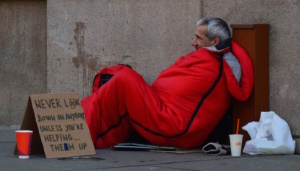Outside London’s Piccadilly theatre where tickets cost up to 110 pounds and a banner advertising the musical “Annie” reads “It’s a hard knock life”, Bryan and Kevin sleep in small tents on the street.

They are among almost 1,000 people who sleep rough in the British capital, according to official figures, while more than 4,000 are on the streets across the country every night.
Bryan, 51, who last year nearly died from pneumonia, became homeless after personal problems led him to drink and drugs.
It’s worse than it used to be right now, but I think it’s down to a lot of things,” he says. “The way people are now – everything is going up and costing more and then the other stuff, services and care, humanity, it’s going down.”
There is wide agreement that the problem has become worse in the last seven years, leading to criticism of the Conservative government’s approach and accusations that its austerity policies, including changes to welfare payments for housing, are partly to blame.
In a report this week, parliament’s Public Accounts Committee (PAC) called the extent of homelessness across England “a national crisis”.
“The latest official figures hammer home the shameful state of homelessness in England and the abject failure of the government’s approach to addressing the misery suffered by many thousands of families and individuals,” PAC chairman Meg Hillier said.
The charity Shelter estimates more than 300,000 people in Britain are homeless, a figure which has risen by 13,000 in a year. It says one in every 200 people in England are homeless and 128,000 children will be without a home this Christmas.
Official figures show that there were 4,134 rough sleepers counted on a single night in autumn 2016, an increase of 134 percent since 2010 when there were fewer than 1,800.
“All you really want is a gaff (place) of your own,” says Jimmy, who beds down in a subway near Waterloo Station.
“People come from out of town into the city at Christmas – you make more money – so it’s harder for us who are here all the time,” said Jimmy, 51, who originally hails from Glasgow in Scotland.
There is both a human and financial cost to the problem. The average age of death of someone who is rough-sleeping is 47 and people living on the street are 17 times more likely to be the victims of violence than those in settled accommodation.
“I‘m getting to a point where I can’t do it anymore, I‘m trying to save my money but it’s hard,” said John, 19, one of a small group of men living under Waterloo Bridge.
Andrew, who now has a place to live but returns to hang out with his homeless friends under the bridge, recalls how he was offered drugs on his first night on the streets: “I said ‘no mate, I‘m not into that’ and he said ‘It’s a free trial, no strings.’”
While he has escaped the streets, Andrew is pessimistic about John’s future. “He won’t get himself off the streets, it’s almost impossible without help,” he said.
As to the financial impact, the National Audit Office, parliament’s spending watchdog, said local authorities had spent 1.15 billion pounds ($1.54 billion) on homelessness services in 2015-16.
NAO head Amyas Morse said in September the government’s “recent performance in reducing homelessness therefore cannot be considered value for money.”
The government has set a target of halving rough sleeping by 2022 and abolishing it by 2027. Last week, Prime Minister Theresa May told members of parliament the government would spend 500 million pounds on tackling homelessness and was putting in projects to tackle rough sleeping.
“We do not want to see anybody who is homeless or anybody who is sleeping rough on our streets,” May said.
But critics say the Conservatives, who have been in power since 2010, have done little to find solutions and warn that the problem could get even worse.
“We heard that over the next 10 years, if the current trajectory stays as it is, the 160,000 people who are homeless in a year could increase by 25 percent and the 9,100 people sleeping rough could rise by 76 percent,” the PAC report said.
Meanwhile for some of those who have been homeless for a number of years, getting off the streets can be difficult, especially for those battling drug additions.
One of those is Bryan outside the Piccadilly Theatre. Despite his problems, he says he refuses to take any money from children, recalling how one girl recently tried to give him her pocket money.
“Afterwards I sat and I cried,” he said.
Kindly follow us on twitter:@AfricanVoice2










